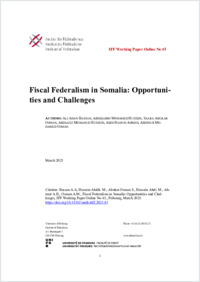Fiscal Federalism in Somalia : Opportunities and Challenges
BFD
- Hassan, Ali Adan
- Hussein, Abdikarim Mohamed
- Osman, Saara Abukar
- Hussein, Abdiaziz Mohamud
- Ahmed, Abdi Hamud
- Osman, Abdinur Mohamed
- Fribourg : IFF, 2025
Federalism
Fiscal federalism
Revenue assignment
Functional assignment
Provisional constitution
Intergovernmental relations
Natural resources
Citizen participation
Somalia
English
Following several extensive negotiations and reconciliation efforts, Somalia marked a historic milestone with the formation of its first internationally recognized Transitional National Government in 2000, followed by the Transitional Federal Government in 2004. Somalia made another significant breakthrough in 2012 with the adoption of a provisional constitution, establishing a two-tier system of governance comprising the Federal Government and Federal Member States: Puntland, Jubaland, Southwest, Galmudug, and Hirshabelle. Since then, Somalia has made significant progress in creating federal institutions, particularly in fiscal federalism, through the establishment of intergovernmental platforms that reached important agreements and achieved critical milestones. However, advancing the fiscal federalism agenda remains challenging, with issues such as constitutional ambiguities, unclear functional and revenue-raising responsibilities, ineffective resource-sharing arrangements, and recurring intergovernmental disputes between the Federal Government and Member States.
- Collections
- Faculty
- Faculté de droit
- Department
- Institut du Fédéralisme
- Language
-
- English
- Classification
- Law, jurisprudence
- Series statement
-
- IFF Working Paper Online ; 45
- License
- Open access status
- diamond
- Identifiers
-
- DOI 10.51363/unifr.diff.2025.45
- ISSN 2813-5261
- Persistent URL
- https://folia.unifr.ch/unifr/documents/331432
Statistics
Document views: 544
File downloads:
- 45_IFF-Joint paper_2024-SU-Participants: 392
